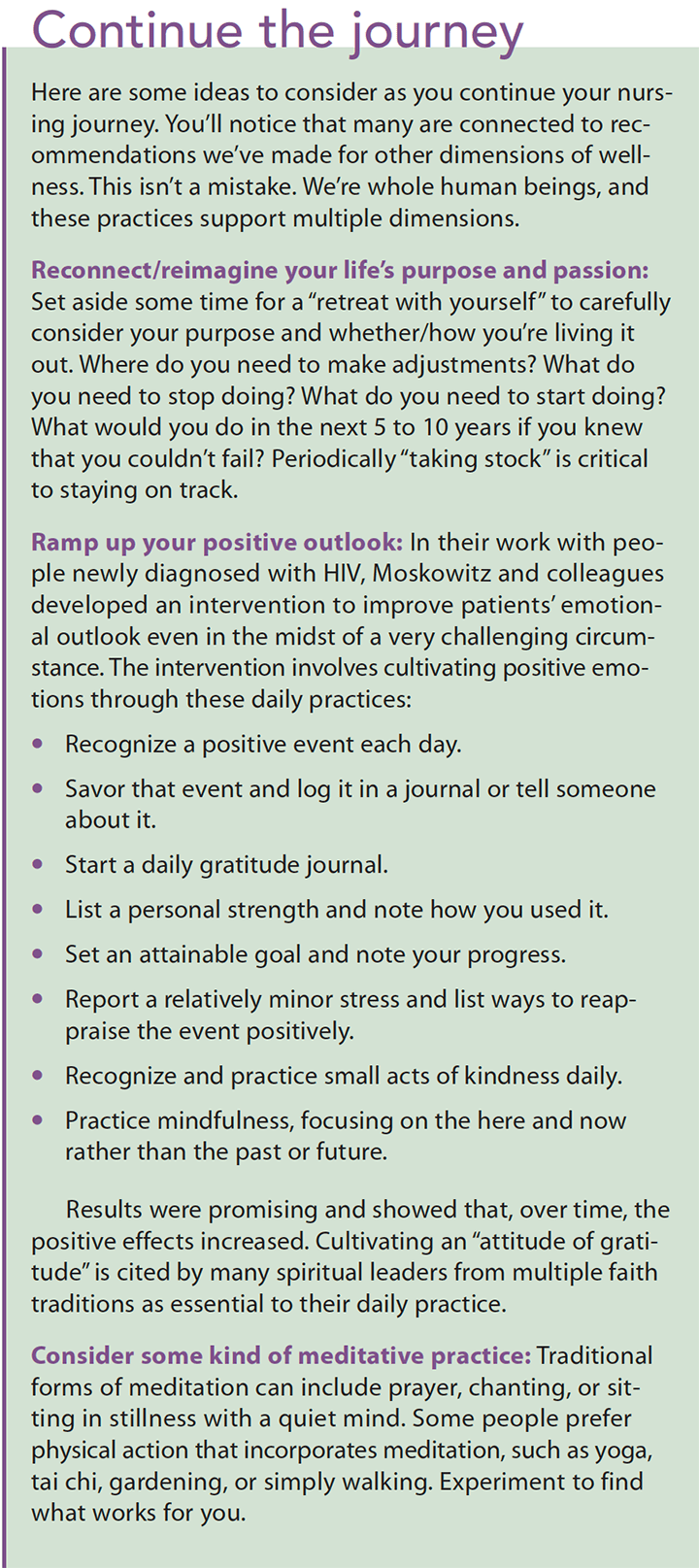Through spirituality, we connect with the world around us.
Takeaways:
- Spirituality involves a sense of connection outside ourselves and includes our values, meaning, and purpose
- A faith community or organized religion can give you an outlet for your spirituality, but religion isn’t spirituality’s only expression.
- Our purpose, our reason for living on this planet, is at the foundation of our spiritual nature.
Editor’s note: This is the last installment in a 10-article series on wellness. You can read all of articles in the series at myamericannurse.com/category/wellness101/. Thank you to the authors at The Ohio State University College of Nursing for their support of nurse wellness.
HAVE you ever felt like a “human doing” instead of a “human being”? As we fling ourselves from one activity to another, we sometimes find that getting beyond our list of “to do’s” and staying in touch with those aspects of our lives that mean the most to us is difficult. Remember that well-rounded self-care also involves spiritual wellness.
What is spirituality?
 Barbara Dossey, a pioneer in the holistic nursing movement, writes that our spirituality involves a sense of connection outside ourselves and includes our values, meaning, and purpose. Your spiritual well-being isn’t what you own, your job, or even your physical health. It’s about what inspires you, what gives you hope, and what you feel strongly about. Your spirit is the seat of your deepest values and character. Whether or not you practice a religion, you can recognize that a part of you exists beyond the analytical thinking of your intellect; it’s the part of you that feels, makes value judgments, and ponders your connection to others, to your moral values, and to the world. For this reason, spirituality frequently is discussed in terms of a search. Spiritual wellness is a continuing journey of seeking out answers and connections and seeing things in new ways. It also means finding your purpose in life and staying aligned with it.
Barbara Dossey, a pioneer in the holistic nursing movement, writes that our spirituality involves a sense of connection outside ourselves and includes our values, meaning, and purpose. Your spiritual well-being isn’t what you own, your job, or even your physical health. It’s about what inspires you, what gives you hope, and what you feel strongly about. Your spirit is the seat of your deepest values and character. Whether or not you practice a religion, you can recognize that a part of you exists beyond the analytical thinking of your intellect; it’s the part of you that feels, makes value judgments, and ponders your connection to others, to your moral values, and to the world. For this reason, spirituality frequently is discussed in terms of a search. Spiritual wellness is a continuing journey of seeking out answers and connections and seeing things in new ways. It also means finding your purpose in life and staying aligned with it.
Although religion and spirituality can be connected, they’re different. A faith community or organized religion can give you an outlet for your spirituality, but religion isn’t spirituality’s only expression. Hope, love, joy, meaning, purpose, connection, appreciation of beauty, and caring and compassion for others are associated with spiritual well-being.
Spirituality as part of nurses’ DNA
As nurses we’re fortunate that the very basis of our practice is grounded in spiritual ideals. From the beginning of our education, we learn about the importance of spirituality in relation to a person’s overall health. Even our ethics emphasize the value of a spiritual connection. Provision 1 of the Code of Ethics for Nurses with Interpretive Statements states, “The nurse practices with compassion and respect for the inherent dignity, worth, and unique attributes of every person.” But many nurses are surprised to find that Provision 5 extends this compassion and respect to nurses themselves: “The nurse owes the same duties to the self as to others, including the responsibility to promote health and safety, preserve wholeness of character and integrity, maintain competence, and continue personal and professional growth.” We have a responsibility to both our patients and to ourselves to honor our spiritual heritage.
Think about your job and what you do every day. When do you feel most energized? Great satisfaction can come from learning a new skill and mastering it, and of course it’s vital that you complete your many tasks efficiently and competently, but there’s more. When asked about the times they felt most energized, many nurses cite moments when they really connected with another person—family, friends, colleagues, patients. This is the “more”—when we go beyond just our needs and wants to connect beyond ourselves. Humans are wired to be in relationship with others. Spirituality is fundamental to nursing practice.
Disconnected much?
Although most nurses would likely agree that spirituality is an important component in the care they provide and in their personal lives, too often the pressures of modern life interfere with what’s most important to us. Crushing workloads, family responsibilities, financial pressures, and fast-paced living create the perfect storm that makes acting on our values difficult. Many nurses suffer chronic illnesses, including depression, at a rate greater than the general population and other health professionals. In a study, Letvak and colleagues dem – onstrated that nurses are twice as depressed as the patients they serve. A study by Melnyk and colleagues of more than 2,000 nurses across the country found more than half of the nurses reported poor mental or physical health and depression. Additionally, nurses with “…worse health were associated with 26% to 71% higher likelihood of having medical errors.”
Living life on purpose
In his groundbreaking work with professional athletes, performance psychologist Jim Loehr, EdD, argues that being out of touch with our life’s purpose creates an extraordinary energy drain. People may run in marathons, eat the healthiest foods, and be at the top of their game professionally, but these really good things can become an end to themselves when they’re disconnected from life’s purpose. Without that connection, anything can become meaningless.
Loehr writes: “When you find—or, more aptly, choose—your purpose, then you are the agent of your own happiness. You have the opportunity to harvest joy in both the pursuit and the achievement, the journey and the destination.” Our purpose, our reason for living on this planet, is at the foundation of our spiritual nature.
Joy in the journey
All of us experience tragedy, sadness, and grief; they’re part of the human condition. If you’re wondering if finding joy and peace is possible under what appear to be impossible conditions, remember this: History is replete with ordinary humans rising to challenges of the day in extraordinary ways. They were able to unlock that part of themselves that gave them the strength and courage to carry on. Nurses are extraordinary—don’t lose sight of the amazing work you do to improve the lives and comfort of the people you touch. It’s never too late to make a positive change in your life. (See Continue the journey.) If you take a few small steps in the direction you want to go, you’ll be amazed at the results.

The authors work at The Ohio State University in Columbus. David Hrabe is associate professor of clinical nursing and executive director of academic innovations and partnerships for The Ohio State University College of Nursing. Bernadette Mazurek Melnyk is the vice president for health promotion, university chief wellness officer, dean and professor in the College of Nursing, professor of pediatrics and psychiatry in the College of Medicine, and executive director of the Helene Fuld Health Trust National Institute for Evidencebased Practice in Nursing and Healthcare. Susan Neale is senior writer/editor of marketing and communications in the College of Nursing.
Selected references
American Nurses Association. Code for Nurses with Interpretive Statements. 2nd ed. Silver Spring, MD: Nursebooks.org; 2015.
Dossey BM. Integrative health and wellness assessment. In: Dossey BM, Luck S, Schaub BS, eds. Nurse Coaching: Integrative Approaches for Health and Well – being. North Miami, FL: International Nurse Coach Association; 2015; 109-21.
Letvak S, Ruhm CJ, McCoy T. Depression in hospital-employed nurses. Clin Nurse Spec. 2012;23(3):177-82.
Loehr J. The Power of Story: Rewrite Your Destiny in Business and in Life. New York: Free Press; 2007.
Melnyk BM, Orsolini L, Tan A, et al. A national study links nurses’ physical and mental health to medical errors and perceived worksite wellness. J Occup Environ Med. 2018;60(2):126-31.
Moskowitz JT, Carrico AW, Duncan LG, et al. Randomized controlled trial of a positive affect intervention for people newly diagnosed with HIV. J Consult Clin Psychol. 2017;85(5):409-23.
ant10-Wellness Spiritual-919



















1 Comment.
To write an accurate spiritual book, you need to do more than just reading. You must do an in-depth research using sources that are accurate and credible. In essence, having surface knowledge on spirituality is not enough to write a good and effective spiritual book. You need to possess a thorough and profound understanding of the many aspects of spirituality – its concepts, principles, applications, and truths. This is to ensure that your book is going to be free from deceptions and false teachings that might harm the spiritual well-being of your readers.